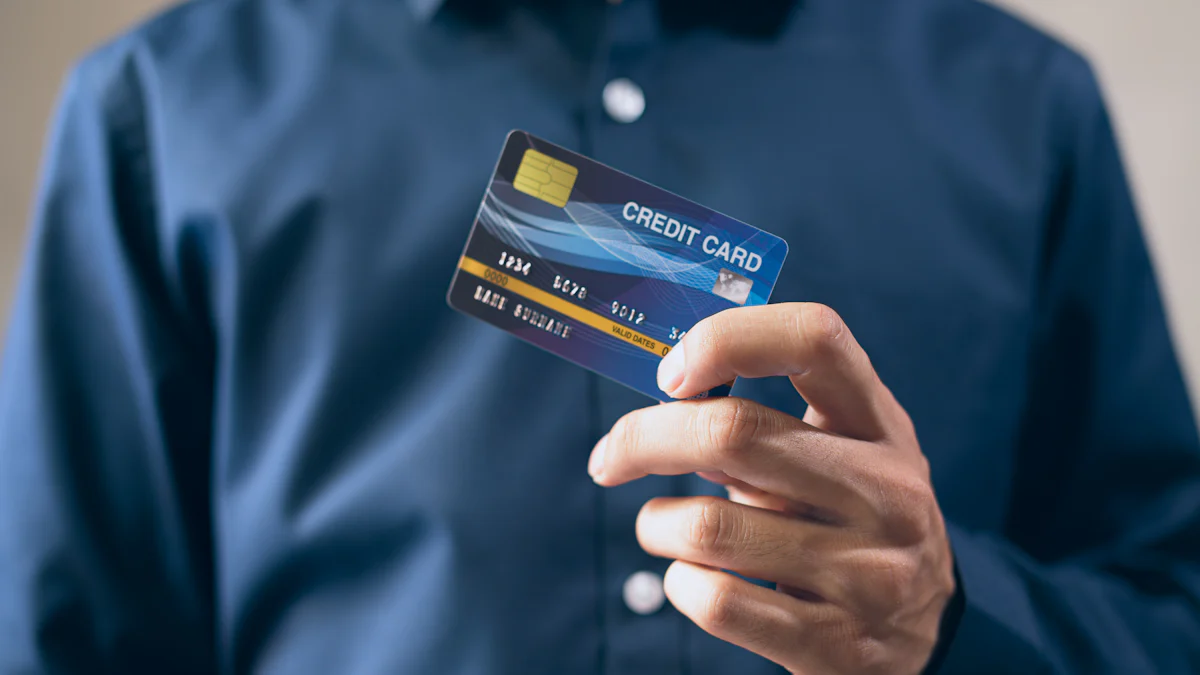The Do’s and Don’ts of Credit Card Usage

Using credit card usage can simplify your finances, but it also comes with risks. Mismanaging credit card usage often leads to financial struggles. Households with credit card debt face more challenges than those without it. For example:
Timely bill payments dropped from 60% to 57% among those with debt.
Savings for three months fell from 40% to 37%.
Confidence in long-term goals rose from 49% to 54% for households without debt.
By managing your credit card usage wisely, you can build a positive payment history and avoid financial pitfalls.
Key Takeaways
Pay your full credit card bill every month. This avoids interest and helps your credit score.
Check your credit card spending often to spot mistakes or fraud. This also helps you stick to your budget.
Use credit card rewards smartly. Plan your buys and don’t overspend.
Look at your credit card statements every month. Make sure they are correct and check for charges you didn’t make.
Keep your credit card use low, under 30%. This improves your credit score and gives you more financial freedom.
The Do’s of Credit Card Usage

Pay Your Balance in Full
Paying your credit card balance in full each month is one of the smartest habits you can develop. It helps you avoid costly interest charges, which can reach up to 25% annually. Carrying a balance means you’ll pay more than the original purchase price due to compounding interest. By paying in full, you also maintain a low credit utilization ratio, which is crucial for a good credit score. Lenders prefer when you use less than 30% of your available credit. This habit not only saves money but also improves your credit history over time, making you a more attractive borrower.
Monitor Credit Card Spending
Keeping track of your credit card spending is essential for staying in control of your finances. Without monitoring, you risk overspending or missing errors in transactions. Fraudulent charges or identity theft can go unnoticed if you don’t review your spending regularly. Additionally, recurring subscription charges can pile up, draining your budget. By checking your transactions frequently, you can catch these issues early and adjust your credit card spending habits to avoid financial strain.
Leverage Rewards and Benefits
Credit card rewards can provide significant value when used wisely. Many cards offer cash back, such as 6% back on groceries, or promotional bonuses like a $100 gift card for new users. Some cards even include perks like rental car insurance or payment protection. To maximize these benefits, use your card for purchases you already plan to make. Avoid unnecessary spending just to earn rewards. If you have multiple cards, choose the one that offers the best rewards for specific categories, such as dining or travel. This approach ensures you get the most out of your credit card rewards without overspending.
Regularly Review Statements
Reviewing your credit card statements regularly is essential for maintaining control over your finances. Errors or fraudulent activities can occur without your knowledge, and catching them early can save you from financial headaches. By reviewing your statements, you ensure that all transactions are accurate and authorized.
Here’s why this habit is crucial:
Catch Errors: Mistakes like double charges or incorrect fees can slip through unnoticed. Regular reviews help you identify and address these issues promptly.
Prevent Fraud: Unauthorized transactions or identity theft can wreak havoc on your finances. Monthly checks allow you to spot suspicious activity and take immediate action.
Understand Your Spending: Statements provide a detailed list of purchases. Reviewing them helps you stay aware of your credit card spending habits and avoid overspending.
Monitor Recurring Charges: Subscriptions or memberships can add up over time. Checking your statements ensures you’re not paying for services you no longer use.
Compare Receipts: Keeping receipts and comparing them to your statement helps you identify discrepancies.
If you notice any errors or unauthorized charges, report them within 60 days to protect yourself. This practice not only safeguards your finances but also helps you maintain a healthy credit score by ensuring accurate reporting of your credit card usage.
Use Credit Cards to Build Credit
Using credit cards responsibly plays a significant role in building a strong credit history. A good credit history opens doors to better financial opportunities, such as lower interest rates on loans or mortgages.
Here’s why credit cards are effective tools for improving your credit score:
Establish Payment History: Timely payments show lenders that you’re reliable. This is one of the most important factors in determining your credit score.
Maintain Low Utilization: Using less than 30% of your available credit demonstrates responsible credit card usage. This positively impacts your credit score.
Start Small: Secured or student credit cards are excellent options for individuals with limited credit history. These cards help you build credit while minimizing risk.
To maximize the benefits, always pay your bill on time. Setting up autopay ensures you never miss a payment. Avoid applying for multiple cards in a short period, as too many hard inquiries can lower your credit score. By following these practices, you can use credit cards as a stepping stone to financial success.
The Don’ts of Credit Card Usage
Avoid Maxing Out Your Credit Limit
Maxing out your credit limit can lead to serious financial consequences. When you use too much of your available credit, your credit utilization ratio increases. This ratio, which accounts for 30% of your credit score, should ideally stay below 30%. For the best results, aim for under 10%. High utilization signals to lenders that you may be over-reliant on credit, which can lower your credit score.
Exceeding your credit limit also creates other challenges:
Your minimum payment will increase, making it harder to pay off your balance.
You risk going over your limit, which may result in fees or penalties.
Card issuers might reduce your credit limit, further restricting your financial flexibility.
Keeping your credit card spending well below your limit helps you maintain a healthy credit score and avoid unnecessary stress.
Don’t Miss Payments
Missing payments on your credit card can have long-lasting effects on your financial health. Payment history makes up 35% of your credit score, so even one late payment can cause significant damage. If your payment is over 30 days late, it may be reported to credit bureaus and remain on your credit report for up to seven years.
Late payments also come with costly penalties. Fees typically range from $25 to $35, and your interest rate could rise to a penalty APR as high as 29.99%. The longer you delay, the worse the consequences:
At 30 days late, your credit score takes a hit.
At 60 days, penalties increase, and your score drops further.
At 120 days, your account may go to collections.
To avoid these issues, set up automatic payments or reminders. Paying on time protects your credit score and saves you money.
Limit Applications for New Credit Cards
Applying for too many credit cards in a short period can harm your credit score. Each application triggers a hard inquiry on your credit report, which can lower your score. Unlike loan inquiries, credit card inquiries are treated individually, so multiple applications can have a cumulative negative effect.
Frequent applications may also signal to lenders that you’re financially unstable, making it harder to get approved for new credit. To manage your credit responsibly:
Only apply for cards you truly need.
Space out applications to minimize the impact on your credit score.
Focus on maintaining a low credit utilization ratio and paying on time.
By limiting new applications, you can protect your credit score and avoid unnecessary debt.
Avoid Impulse Purchases
Impulse purchases can derail your financial stability, especially when using credit cards. Understanding why these purchases happen can help you avoid them. Credit cards reduce the immediate pain of payment, making it easier to spend without considering the long-term impact. Unlike cash, where you feel the expense instantly, credit card spending delays the financial consequences. This delay often leads to overspending.
Several psychological triggers encourage impulse buying:
Credit cards activate reward sensations in your brain, making purchases feel more satisfying.
You may overvalue the benefits of an item while ignoring its cost.
Stress or emotional distress can push you to shop as a way to improve your mood.
Impulse purchases often result in unnecessary debt. They increase your credit card balance, which can lead to higher minimum payments and a higher credit utilization ratio. Both of these factors negatively affect your credit score. To avoid this, create a budget and stick to it. Before making a purchase, ask yourself if it’s a need or a want. Waiting 24 hours before buying can also help you make more rational decisions.
Don’t Overlook Interest Rates and Fees
Ignoring interest rates and fees on your credit card can cost you significantly over time. Credit card APR, or annual percentage rate, determines how much interest you’ll pay if you carry a balance. Different types of APRs apply to various transactions, as shown below:
Type of APR | Description |
|---|---|
Purchase APR | The standard interest rate applied to purchases made with the credit card. |
Balance Transfer APR | The interest rate on balances transferred from other loans or credit cards, often starting low. |
Introductory APR | A temporary low rate offered to new applicants, often 0% for a limited time. |
Cash Advance APR | The rate applied when withdrawing cash using the credit card. |
Penalty APR | A higher rate applied if a payment is missed, which can reach up to 29.99%. |
Grace Period | A period of at least 21 days where no interest is charged if the balance is paid in full. |
Credit card fees, such as annual fees, late payment fees, and foreign transaction fees, can also add up quickly. Comparing credit cards based on APR, rewards, and fees helps you make informed decisions. Focus on cards with low rates and minimal fees that align with your spending habits. By understanding these costs, you can avoid unnecessary expenses and manage your credit card responsibly.
Tips for Long-Term Credit Card Success

Maintain a Low Credit Utilization Ratio
Keeping your credit utilization ratio low is essential for maintaining a healthy credit score. This ratio measures how much of your available credit you use. Experts recommend keeping it below 30%, but for the best results, aim for under 10%. Using less credit shows lenders that you manage your finances responsibly.
Here’s why maintaining a low ratio benefits you:
It helps you achieve a good credit score, which is crucial for securing loans and credit cards.
A strong credit score allows you to negotiate better interest rates, saving you money in the long run.
It gives you more financial flexibility when opening new credit accounts.
To lower your credit utilization, pay off balances regularly and consider requesting a credit limit increase. These strategies ensure you stay within the ideal range and improve your financial health over time.
Build an Emergency Fund
An emergency fund is a financial safety net that prevents you from relying on credit cards during unexpected situations. Saving for emergencies helps you avoid high-interest debt and provides peace of mind. Experts suggest building a fund that covers three to six months of living expenses.
Follow these steps to create your emergency fund:
Open a dedicated savings account.
Determine your savings goal based on monthly expenses.
Set aside a fixed amount each month.
Use direct deposit to automate savings.
Add extra money from bonuses or windfalls.
Replenish the fund after using it.
With an emergency fund in place, you can handle financial surprises without jeopardizing your credit card balance or credit score.
Regularly Check Your Credit Report
Reviewing your credit report is vital for detecting errors or fraud. Mistakes in your report can lead to higher interest rates or loan denials. Checking your report ensures that your financial information is accurate and up to date.
Key areas to review include:
Personal Information: Verify your name, address, and Social Security number.
Credit Accounts: Confirm that all listed accounts belong to you.
Public Records: Check for accurate details on bankruptcies or liens.
Inquiries: Ensure all credit inquiries were authorized by you.
Experts recommend reviewing your credit report at least once a year. For better monitoring, consider checking it quarterly. Regular reviews help you spot identity theft early and maintain a strong credit score.
Upgrade Credit Cards Strategically
Upgrading your credit card can unlock better rewards and benefits, but you need to approach it thoughtfully. A strategic upgrade ensures you maximize value without harming your financial health.
Here are key factors to consider before upgrading:
Impact on Credit Score: Upgrading usually doesn’t involve a hard inquiry, so it won’t lower your credit score.
Potential Benefits: Evaluate the upgraded card’s perks, such as higher cashback rates, travel rewards, or exclusive benefits.
Issuer-Specific Rules: Some issuers have unique policies. For example, Chase’s 5/24 rule limits new card approvals but doesn’t apply to upgrades. American Express allows only one welcome bonus per card, which may affect your decision.
Bonus Offers: Compare the welcome bonuses of the upgraded card with other options to ensure you’re getting the best deal.
Tip: Always calculate whether the card’s annual fee is worth the added benefits. If the rewards outweigh the cost, the upgrade could be a smart move.
Upgrading can also simplify your financial life. You keep the same account number, which preserves your credit history. This helps maintain a strong credit score. However, if the upgraded card doesn’t align with your spending habits, it may not be the right choice. Take time to research and compare options to make an informed decision.
Educate Yourself on Credit Card Terms
Understanding credit card terms empowers you to make smarter financial decisions. Many people overlook these details, leading to unexpected fees or missed opportunities.
Here are some essential terms you should know:
Term | Definition |
|---|---|
APR (Annual Percentage Rate) | The yearly interest rate charged on balances. Lower APRs save you money. |
Grace Period | The time (usually 21 days) to pay your balance without incurring interest. |
Minimum Payment | The smallest amount you must pay to avoid late fees. Paying only this increases debt. |
Credit Limit | The maximum amount you can borrow. Staying below 30% of this limit is ideal. |
Penalty APR | A higher interest rate applied after late payments. |
Note: Familiarizing yourself with these terms helps you avoid costly mistakes and use your credit card effectively.
Take time to read your card’s terms and conditions. This ensures you understand fees, rewards, and penalties. Knowledge of these details allows you to maximize benefits while minimizing risks.
Responsible credit card usage helps you achieve financial stability. It allows you to build a strong credit score, earn valuable rewards, and avoid unnecessary debt. By following the do’s and don’ts outlined in this guide, you can maximize the benefits of your credit card while minimizing risks. Start applying these strategies today. Take control of your spending habits and create a secure financial future. Small, consistent actions lead to long-term success.
Remember, your credit card is a tool. Use it wisely to unlock opportunities and avoid financial pitfalls.
FAQ
Why should you avoid carrying a credit card balance?
Carrying a balance leads to high-interest charges, which increase your debt over time. Paying in full each month saves money and improves your credit score. It also helps you avoid financial stress caused by compounding interest.
Why is it important to monitor your credit utilization ratio?
Your credit utilization ratio impacts 30% of your credit score. A high ratio signals financial over-reliance on credit, which lowers your score. Keeping it below 30% shows lenders you manage credit responsibly.
Why do missed payments harm your credit score?
Missed payments damage your payment history, which makes up 35% of your credit score. Lenders view late payments as a sign of financial instability. This can lead to higher interest rates or loan denials.
Why should you review your credit card statements regularly?
Reviewing statements helps you catch errors, fraud, or unauthorized charges early. It ensures accurate reporting of your spending and protects your finances. This habit also keeps you aware of recurring charges or subscriptions.
Why is understanding credit card terms essential?
Knowing terms like APR, grace period, and penalty fees helps you avoid costly mistakes. It empowers you to make informed decisions, maximize rewards, and minimize unnecessary expenses. Understanding these terms ensures smarter credit card usage.
See Also
Essential Insights On 2025 Credit Card Interest Rates
Understanding The Basics Of Credit Scores
Effective Strategies To Cut Down Daily Expenses

